Our Experience developing a Guest and Host travel app
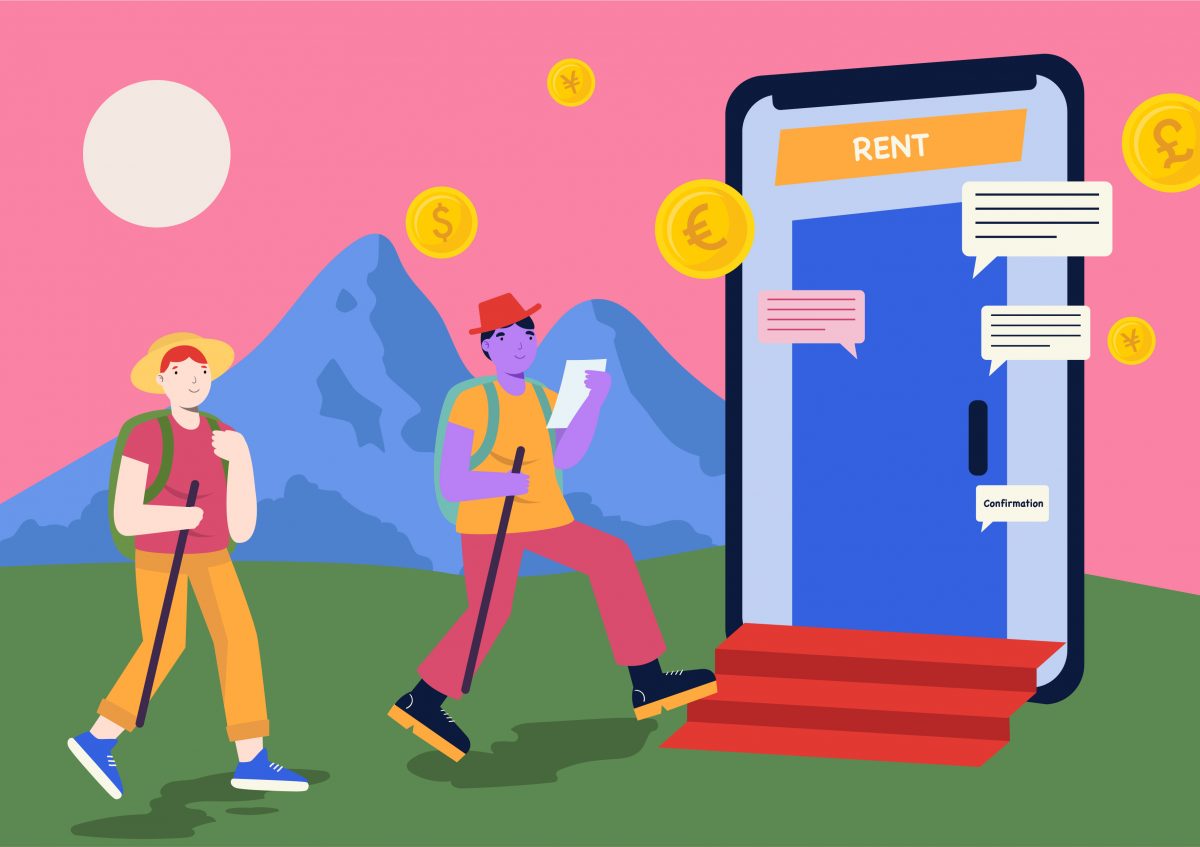
If you want to make an app like Airbnb, here you can find a list of its essential features and get an idea of the development process and possible cost.
Tourism was one of the industries the pandemic hit the hardest. However, crises always come with new opportunities, as proven by Airbnb’s own story. It started in 2008 in San Francisco. Two roommates, short of cash, came up with an idea to rent out a couple of air mattresses in their rented apartment in a B&B format. Soon, they decided to enable others to do the same on the web. Currently, their brainchild has over 150 million active users worldwide and is valued at about $130 billion.
Apparently, it could be very beneficial to learn about the Airbnb business model first.
How Airbnb Works
Airbnb is a peer-to-peer marketplace where assets or services are shared between private individuals. Three categories benefit at once:
1. Host s. These people have a house or spare room and want to earn some money as a ‘freelance hotelier.’ The marketplace platform offers them a convenient way to list their property with free professional photos via a website or mobile app. They can communicate with potential guests in the app, choose a trustworthy guest, and safely receive their money. Airbnb provides insurance for the listed properties.
2. Guests. These may be tourists, families planning a vacation, or business people who look for accommodations other than hotels. On Airbnb, they can search multiple listings in their target destination, see all the details of a space, chat with the owner to find out more, and book and pay in-app.
3. Photographers. One of Airbnb’s competitive advantages is high-quality pictures of the properties. It runs a network of freelance photographers in the most popular destinations and pays for their work from the portal.
People that look for a place to stay learn about Airbnb’s services from Internet ads, retargeting ads, email campaigns, promotional offers, and word of mouth.
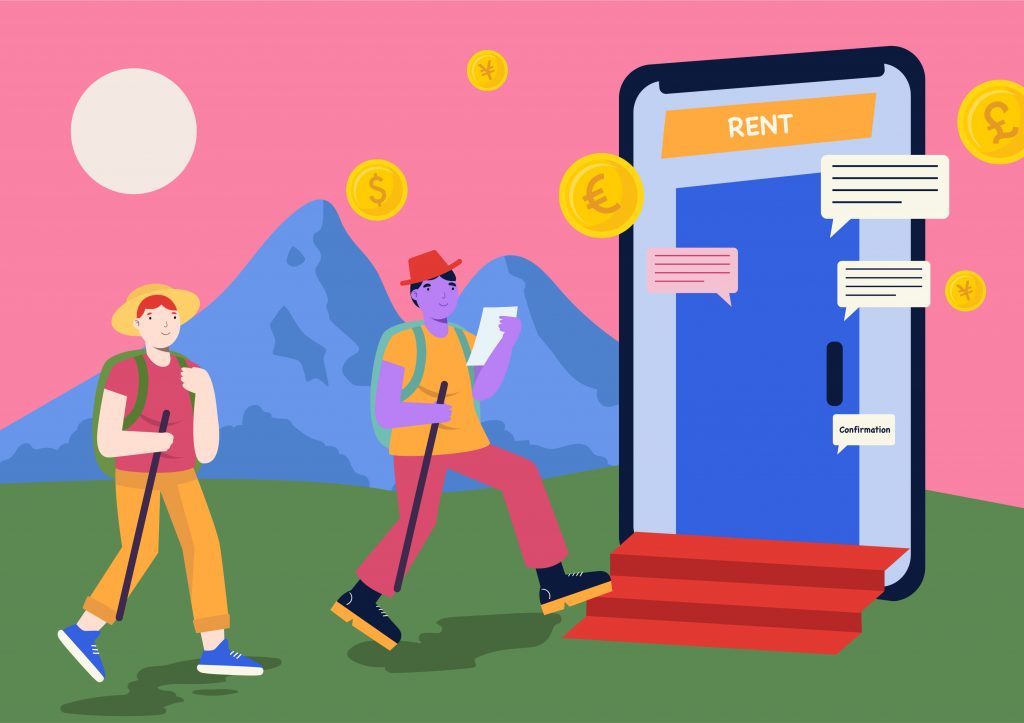
On the website or mobile app, they can set the price range, the accommodation type, essential facilities, and other important criteria. Finding a suitable space, they can contact the owner and request a stay. If accepted, they receive a confirmation via SMS (and push notification, if using a mobile app).
Guests can pay using various methods. The host will receive their money in 24 hours after check-in.
Airbnb provides a rating and review system for hosts and guests. The prices are set automatically: a machine learning algorithm facilitates accurate estimation of the best price in an area and prediction of the demand based on seasonality, a property’s unique features, and price rates.
Entrepreneurs who create a marketplace like Airbnb can expect to earn money in various ways:
- Listing fees. Hosts pay a percentage for listing their property on the platform.
- Promoted listings. Hosts can pay extra for greater visibility for a listing.
- Host сommission. Airbnb charges hosts a service fee, a percentage, for every booking they receive through the platform.
- Transaction fees. Airbnb also charges a percentage on every confirmed reservation to cover the payments processing.
- Service fees. Airbnb charges guests a percentage of their booking fees depending on the size of the reservation, which includes cleaning fees, service fees, occupancy, extra guest fees, currency exchange charge, etc.
- Taxes. The platform can also charge the value-added tax (VAT).
- Currency exchange. If guests need to pay using the platform’s currency converter, it can set the tariffs.
The commission amounts may vary depending on the property value, country, etc. Additional monetization methods include advertising and subscription-based services for hosts and guests.
The cost structure of a platform like Airbnb is likely to include:
- employees (programmers, support, administrators, et al.)
- photographers’ fees
- technological setup and operation of the website and mobile apps
The following chapters aim to describe our experience developing a Guest and Host travel app step-by-step, paying attention to how an entrepreneur’s choices and actions may affect the budget.
Everyone looking to build an app like Airbnb needs to begin by studying its features.
The Core Features of Airbnb-like Apps
Here’s an outline of the functionality required for each role in a marketplace platform: guests, hosts, and administrators.
1. The functionalities for guests
Authorization. To start using the platform, both travelers and hosts need to provide their name, email address, or phone number. Users generally like a quick and convenient login via their Google+ or Facebook accounts; social media integration would also help hosts get an idea of who might arrive. Users also need to agree with the conditions and policies of the app usage. The authentication feature should also enable users to access their guest or host interface.
Profile management. Guests need the ability to enter and update their name, username, account password, birth date, gender, picture, email address, phone number, residence address, and other information that can be verified for the hosts to see before letting them in. Users also want to configure their preferences, such as notifications via SMS, push notifications, payment currency, payment methods, etc.
Search functionality. Search functionality with intuitive filtering should help travelers choose the optimal accommodation. They can search by destination, check-in and check-out dates, number of guests, price, property type, facilities, amenities, number of rooms, beds, bathrooms, etc. The search results should be presented as informative property cards with photos, the possible number of guests, facilities, price, and a map with lodgings pins on it.
Listings. Users need a full and comprehensive description of each property with ratings, photos showing the space from different angles, rating, reviews, available dates, location map, host profile, amenities offered or available, pricing, house rules, cancellation rules, minimum booking period, and other terms and conditions. A ‘Contact Host’ button, once clicked, will initiate sending an email with important information to the host.
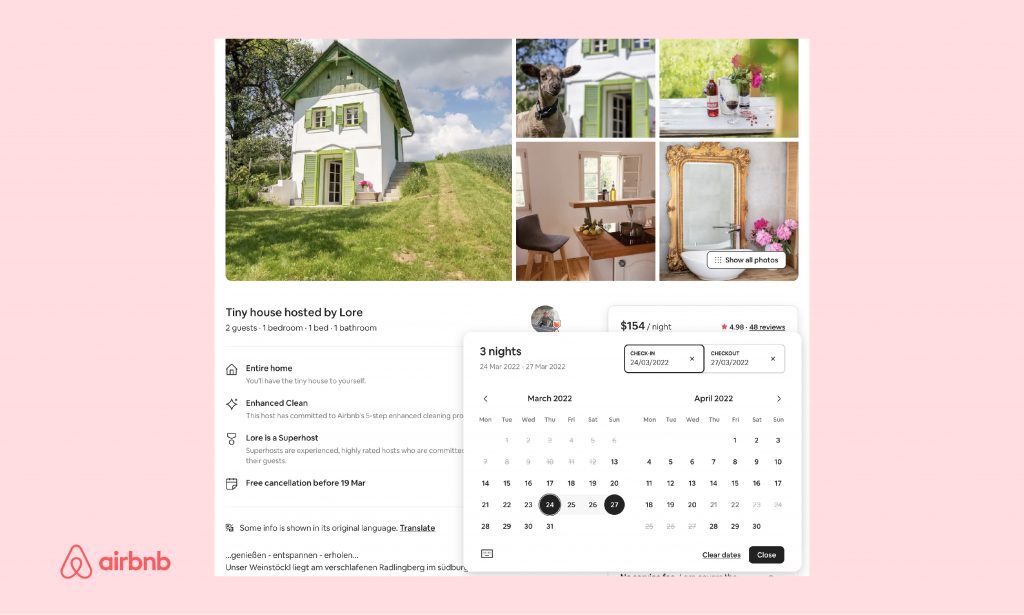
Favorites. Users can shortlist the cards they like to review later. Bookmarks will come in handy for those who want to track the availability of a favorite place and wishlists for those who intend to decide later or don’t know the dates yet. You may add a comparison feature on top of the existing favorites. The user would select or deselect their desired options and click on the Compare button to see a side-by-side comparison of the various properties.
Maps and geolocation. An interactive map provides a sorting system to search around an area with its routes, neighborhoods, amenities, and near landmarks. Travelers can quickly evaluate the options labeled with price tags and get a quick property preview with a couple of photos. They can adjust the geolocation radius manually. It’s convenient for mobile users who may be stuck in a foreign city and need to find somewhere to stay urgently.
Recommendations. If the found property doesn’t seem right, the system should suggest other relevant and similar options.
Chat. An in-app messenger increases the service’s reliability and credibility. The parties can discuss additional booking details, such as the arrival time, delays, number of guests, etc. To preclude negotiations on the side, Airbnb implemented mechanisms that validate data like phone numbers and links so users can’t exchange their contact information.
Booking. Guests may have to enter their phone number, code from SMS, photograph their government ID, and provide more trust details to make their first booking. Otherwise, it should be simple: select desirable dates in a calendar. This will trigger a notification for the host to decide whether to confirm or decline the booking or solve any issues before confirming it. Instant bookings that don’t require a host’s confirmation are also possible. Users also need to monitor their wishlist and view upcoming booking and reservation details.
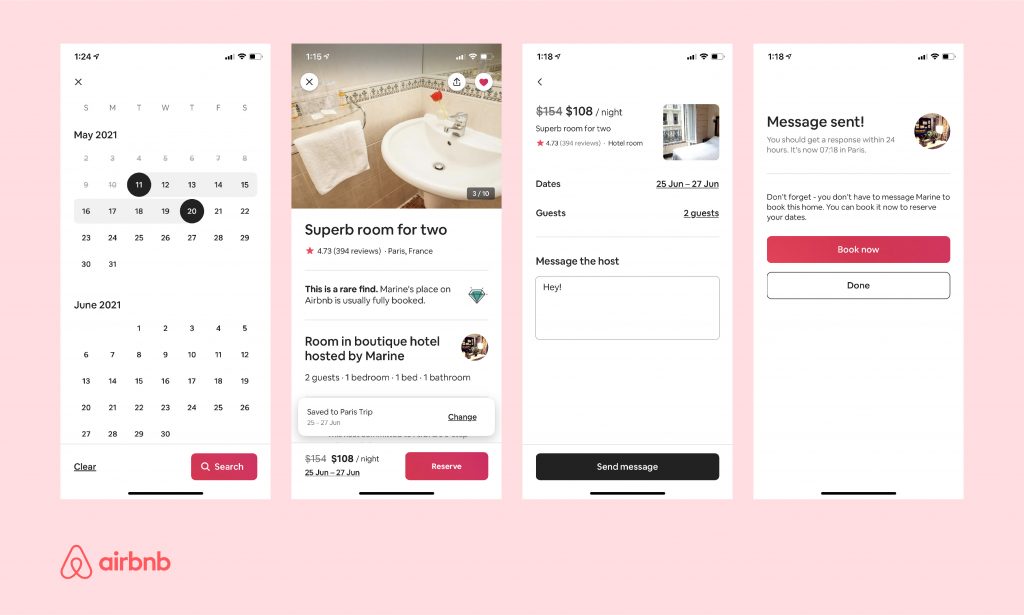
Notifications. Push notifications enable guests and hosts to open a specific web page quickly and always stay up-to-date. Guests should receive instant notifications at least about booking confirmations but can configure their notifications to receive information about deals, offers, etc.
Payment system. Guests should be able to pay for a chosen space using credit/debit cards, Google Pay, PayPal, Apple Pay, etc., select the currency, save receipts, and view their transaction history. During check-out, guests might use coupons, e.g., earned for referrals.
Currency converter. An international marketplace platform should support multiple currencies and languages. One switch can make all pricing be converted automatically.
Users’ reviews and ratings. The guests evaluate an accommodation, their experience, and the host to help other users make a decision.
Customer support. An extensive FAQs section is a must, but a platform like Airbnb should help both hosts and guests solve their problems 24/7. An AI solution can analyze behaviors, queries, and complaints, and a chatbot would answer common questions.
Booking history. A list of previous accommodation bookings can help guests quickly rebook a space they liked.
Social media integration. This solution will enable users to promote your service and invite friends, possibly earning credit money for recommendations. They might create a coupon and share it with their network. Both the referral and the referee would be rewarded for using it.
2. The functionalities for hosts
Registration and authorization. After an initial registration using their email address or social networks profiles, users who want to be hosts need to enter extra personal data and information about their properties. Airbnb prompts users to upload a selfie or scanned headshot and images of government-issued ID, passport, national ID card, or driving license. It takes ML technology to match a user’s image with a document picture to verify their online and physical identities.
Profile management. Hosts can edit personal information like email, mobile number, account password, address, the languages they speak, add/delete payment methods, etc. The host profile should also include the reviews written by previous guests and the host rating.
Listing creation. Hosts need to upload high-definition pictures of their property and its detailed description, indicate the address, accommodation type, space area, possible number of guests, details like quiet hours and other rules, payment details, and set the rent. The host can request a photographer’s service in-app.
Listings management. Hosts should be able to edit, update, and delete their multiple listings, use search and sorting, update information across several listings at once, update photos, manage availability periods, etc.
Requests. Hosts can decline requests they don’t like or accept when everything seems fine.
Bookings. Hosts need the ability to check upcoming bookings in a convenient calendar format and view reservations details. Past bookings and payments received should also be tracked. The app can offer analytics and insights into the revenues, the listings’ profitability, dynamics, etc.
Chat. Hosts need the ability to discuss all details with potential guests before they can accept or decline a booking.
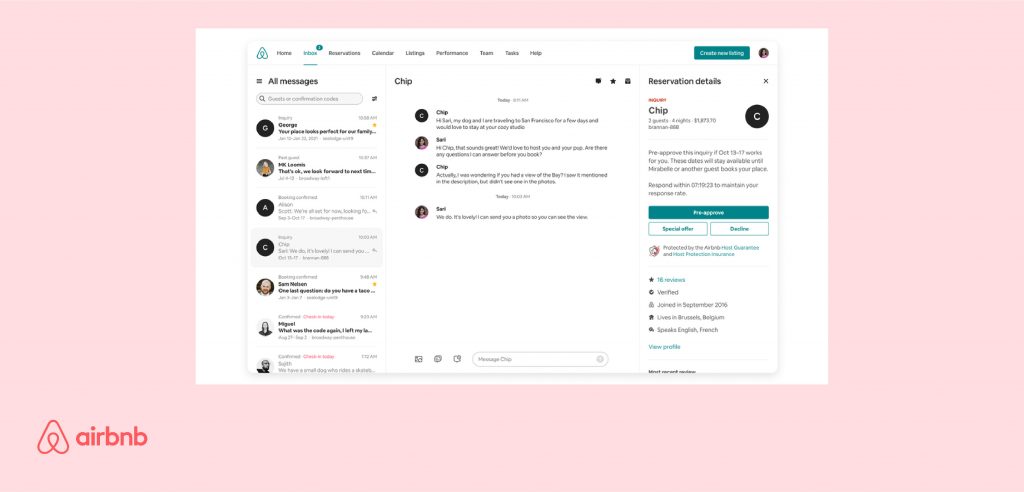
Ratings and reviews. Airbnb protects hosts via its review system: hosts can rate the guests’ behavior and experience with them and write assessments that other hosts can see before approving a guest.
Payment system. Hosts should be able to withdraw their money effortlessly and see transaction history in a convenient format.
Social media integration. Hosts can also invite their friends on social media to download the app or book accommodations.
This list of the guest/host features is not complete. Should your budget allow, you can add various other features to the first or later versions of your application to make them unique and get a competitive edge. For example:
- Hosts can add extra services to property listings, such as entertainment, guided tours, workshops, local activities, etc.
- 360-degree virtual tours of accommodations can facilitate the guests’ decision-making.
- A translation functionality enabling guests to read property descriptions in their native language without using Google Translate will improve their experience.
- User-generated content can help increase your platform’s visibility and popularity.
- Augmented reality features, e.g., a visualization of a property card when users scan a QR code on a building, can make a service unique.
Each feature you want to include in your web or mobile travel app will take time to craft and configure, contributing to the final cost.
The administrators, the third category of users, work behind the curtains facilitating smooth and secure interactions between the guests and hosts. They require the following functionalities:
3. The functionalities for administrators
Roles management system. The administrators manage the hosts, guests, support staff, photographers, managers, and other persons the company may require to use the platform. They need searchable databases and the ability to assume the role of any person in the system if needed.
Listings management. An administrator has to be able to scrutinize, upload, edit, add or delete listings just like hosts do but at scale.
Bookings management. Admins need the ability to view all previous and current bookings, edit, update the statuses, or delete reservations.
Feedback and complaints. Admins should view the guests’ and hosts’ feedback and process their complaints.
Analytics. The company needs vital app statistics to monitor the business’ health, such as the number of new and returning customers, user behaviors, fees, and commissions. Insights about the top destinations, locations, filters, or preferred accommodation types can help the owner make the online marketplace more lucrative.
Finances. The platform requires a system of financial accounts integrated with a chosen payment provider.
The administrators are also likely to need
- a content management system (CMS) for running the content on the platform’s pages, listings details, blog, marketing email templates, and more;
- taxes management panel to facilitate the payment of taxes for users and sending tax forms, since more and more countries require online rental marketplaces to act as tax agents;
- a fraud detection and prevention system.
If you want to build a website like Airbnb the fastest and at the lowest price, consider ready-made templates. CS-Cart, RocketBazaar, Sharetribe, Shopify, and Yo!Kart offer various functionalities. Your business information and consumer data will be stored on the servers along with thousands of other websites. A customizable template will give you more freedom. However, problems are likely to arise when you need to scale the platform.
Alternatively, you can create a platform from scratch. Although more expensive, this approach allows developing specific business logic, maximum adaptation to your customers’ and business needs, and scalability. In this case, it would be helpful to know about the necessary technologies, at least to check them on the CVs when you hire programmers.
Creating a Service like Airbnb: Technology Stack
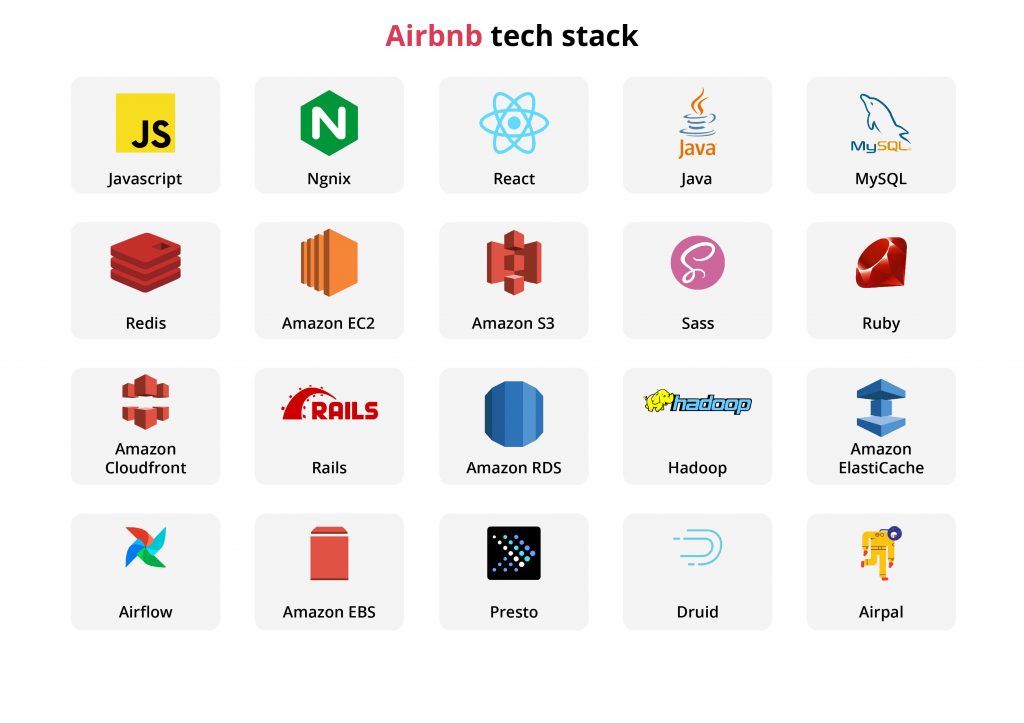
The original Airbnb tech stack is apparently effective, but creators of new services need not necessarily emulate it. There are many options, and a competent software development team will surely select the tech stack most suitable for your project and business needs and will make the most of the chosen technologies, such as:
Front-end programming languages: JavaScript, HTML5, CSS3, TypeScript
Frameworks: React.js, Angular, Vue
Back-end programming languages: Ruby, PHP, Python, Node.js, Java
Frameworks: Ruby on Rails, Laravel, CakePHP, Django, Node.js, Meteor.js, Flask, Express.js, Spring
Cloud storage:Amazon S3, Google Cloud Storage
Cloud hosting:Amazon Web Services (AWS), Google Cloud Platform (GCP), Azure
Automation frameworks: RSpec, Capybara, PhantomJS
SQL data storage: PostgreSQL, MySQL
Key-value/data storage: Redis, Memcached
Web server: Nginx
Cloud-native platforms: MongoDB, AWS DynamoDB
Native mobile app: Kotlin or Swift
Cross-platform mobile app: Flutter, React.js + React Native
Global payment s: Braintree, Stripe, PayPal
Messaging and communication: Twilio, Vero
APIs (application programming interfaces) that enable apps to access functions and databases can be a considerable part of the project. Nowadays, it’s easy to access almost any API, including Airbnb’s own API that allows retrieving and integrating the marketplace functionalities.
How to Make an App like Airbnb in 4 Basic Steps
The basic steps of our experience developing a Guest and Host travel app do not differ much from building an online store or e-learning platform:
- Engage professional marketplace app developers.
- Do your research, determine the project requirements, plan the budget and timeline for the minimum viable product or full-fledged app.
- Create an appealing and trustworthy user interface and user experience (UI/UX).
- Develop and test the platform.
1. Find a competent tech team.
We recommend having experienced developers on board from the onset. They will help you with the requirements documentation and project estimation, suggest viable solutions early on, and so forth.
Entrepreneurs can assemble a team to build the marketplace platform in-house, engage freelancers or an external dedicated team, or outsource the project to an offshore digital agency.
Offshore freelancers may offer the cheapest way to create an app like Airbnb, but it will take you some time to find the right people and then significant effort to manage them. The quality of freelancers’ work is also hard to predict and may be inconsistent, jeopardizing the whole startup.
If local or even domestic specialists are not an option, outsourcing is the go-to. An offshore agency with relevant experience will help you with the initial research, prepare proper project documentation, design the app and manage the dev team just like a local vendor would do, but at a significantly lower price.
You can learn how to find a reliable outsourcing partner from our recent article.
In any case, entrepreneurs building an app like Airbnb are likely to hire:
- 2-3 backend developers
- 2 frontend web developers
- iOS developer (if you create a mobile app)
- Android developer (if you make a mobile app)
- UX/UI designer
- quality assurance (QA) engineer
- project manager (PM)
- booking business analyst (if needed)
2. Do your research and preparations.
Research the target market and try to find a niche. First of all, identify the present guests and hosts’ problems with Airbnb and the ways to solve them. You might target the broadest audiences worldwide or narrow them down and create a marketplace like Airbnb, but for business people, travelers with children, religious people, or whatever groups whose experience with online rental bookings you can improve.
For example, after a negative personal experience and other Airbnb customers’ complaints of discrimination, one of our clients got the idea of catering specifically to LGBTQ guests and hosts. Currently, their platform misterb&b is considered the largest gay hotelier.
You also need to know with whom your platform is going to compete. Besides Airbnb itself, you may start exploring services such as Booking.com, HomeToGo, TripAdvisor, Tripping.com, Vrbo, Flipkey, Wimdu, 9Flats, and apps in your identified niche. The rivals’ advantages, unique features, and shortcomings will give you ideas regarding your app’s core feature set and what could help you beat the competition.
It’s generally recommended to start small and validate your idea first instead of creating a fully-functional Airbnb clone at once. This will save your time and budget and reduce risks.
Your minimum viable product (MVP) may include the guest, host, and admin functionalities listed above, but you also need to invent something to set it apart from the rivals and win over the users.
Your choice of monetization methods will also affect your choice of features. These methods can be limited to those listed above or include something new and unseen before.
After the MVP obtains a user base and you collect feedback from the early adopters and investors (if any), you can gradually add more advanced features to improve the platform.
If you don’t have the time or confidence to carry out these activities yourself, you can delegate the initial stage of your project to a professional agency.
Having formulated your requirements, estimated the budget, and made a project plan, you can either proceed with the product design with the same team or seek another agency’s help.
3. Have your online marketplace designed.
The look-and-feel of a platform like Airbnb has to appeal to the target audience, primarily guests, and inspire confidence. It’s safe to say that the general best practices of e-commerce UX/UI design apply to rental marketplaces as well.
Overwhelming visitors with photos, images, and text is one of the common problems with online marketplaces. Others may scare off hosts with lengthy and complicated registration and listing procedures. Instead, a clean and intuitive interface should make it easy to find and book accommodations quickly, as well as to list one. The UX expert should build a straightforward user flow allowing users to reach their goals in a few steps with minimum scrolling and clicks.
Simultaneously, your color scheme, style, visual elements, and branding must distinguish your platform from the competition. This takes a skillful designer with experience in creating interfaces for platforms like Airbnb.
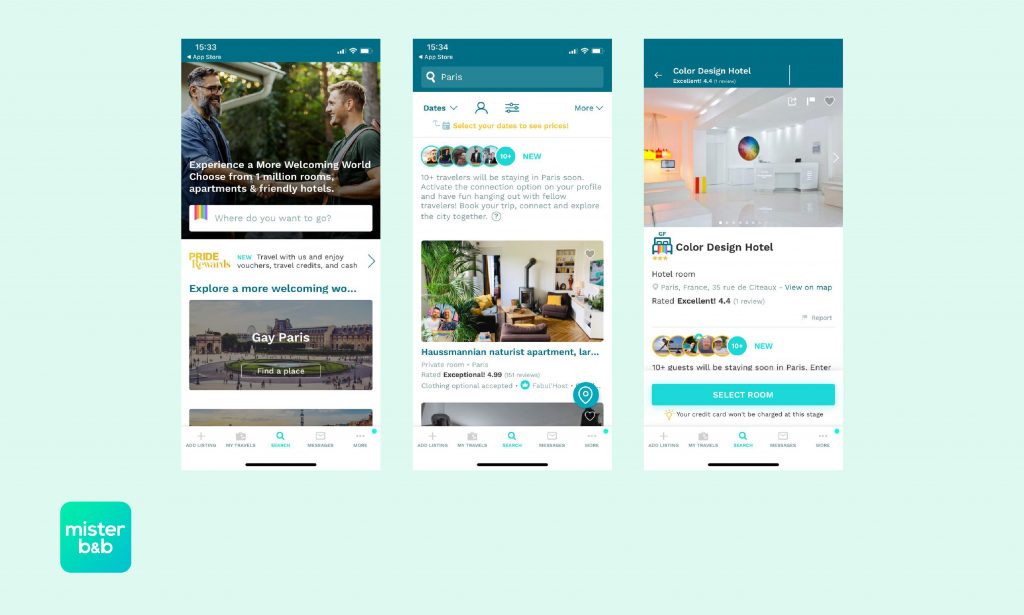
4. Have your website/mobile app built and tested.
Every project starts with fixing a technical base for further operations. Then, the front-end developers will implement the designed interfaces while the back-end developers will build databases and implement APIs, various services, and libraries for the inner workings of the platform.
The developers need to address security regarding permissions, authority, and access. For example, all APIs need secure authentications. Around 25% of the development time will be spent on QA activities.
How Much Does It Cost to Build an App like Airbnb?
The factors that can impact your ‘Airbnb’ app development cost include, but are not limited to:
- the number of functionalities you wish to have
- the technical complexity of the app features
- customization of the design, e.g., if you want to use unique visuals
- the number of platforms and devices the app is being built for
- app architecture solutions
- tech stack choices
- whether licensed APIs and third-party services are used
- the size of the development team
- the type of contract
- the product developers’ salaries or hourly rates of the outsourcing partner
- location and qualification of the developers…
…and more. For example, integration of the Airbnb API can decrease the development time and save a significant amount of money.
Due to varying degrees of complexity and different rates, the selected tech stack also affects the budget, product scalability, and speed of your our experience developing a Guest and Host travel app.
Its cost can be calculated by multiplying the approximate time required for each feature by the specialists’ hourly rates.
Different developers and digital agencies can estimate a feature set described above at 1,000 hours or as much as 6,400 hours. Here’s Alternative-spaces’s rough estimate of a mid-range project.
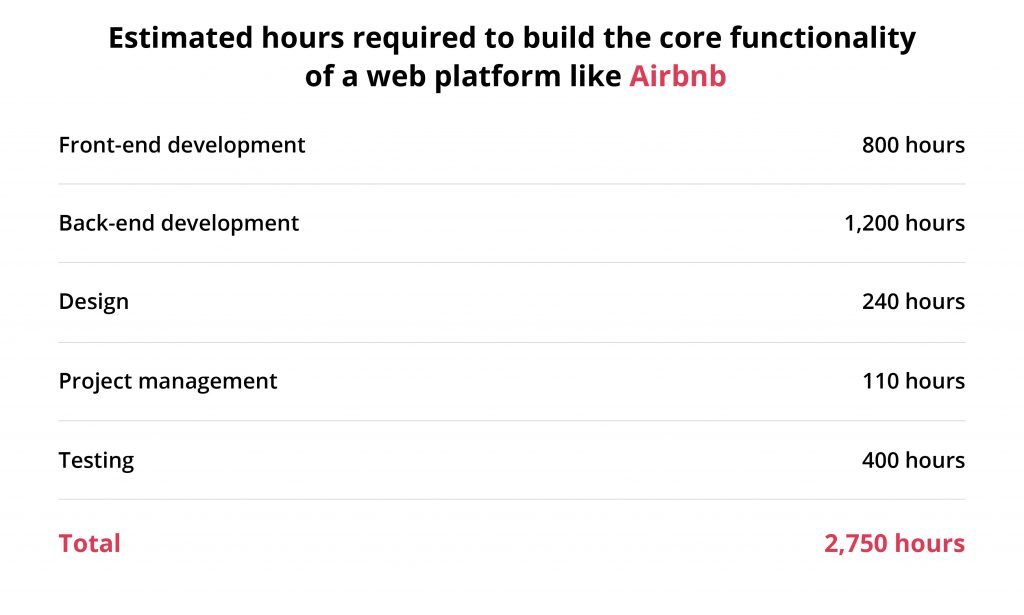
The development of a native iOS/Android app can be estimated at 800-1,450 hours and more.
Only a software development partner that knows all the details of the product’s functionalities and your requirements will be able to provide you with an exact quote.
The most significant factor, however, is the developers’ hourly rates. This enables startups and businesses to cut costs by outsourcing their product development. Thanks to the specialists’ rates varying from country to country and from vendor to vendor, clients often save half of their planned budget without compromising the quality.
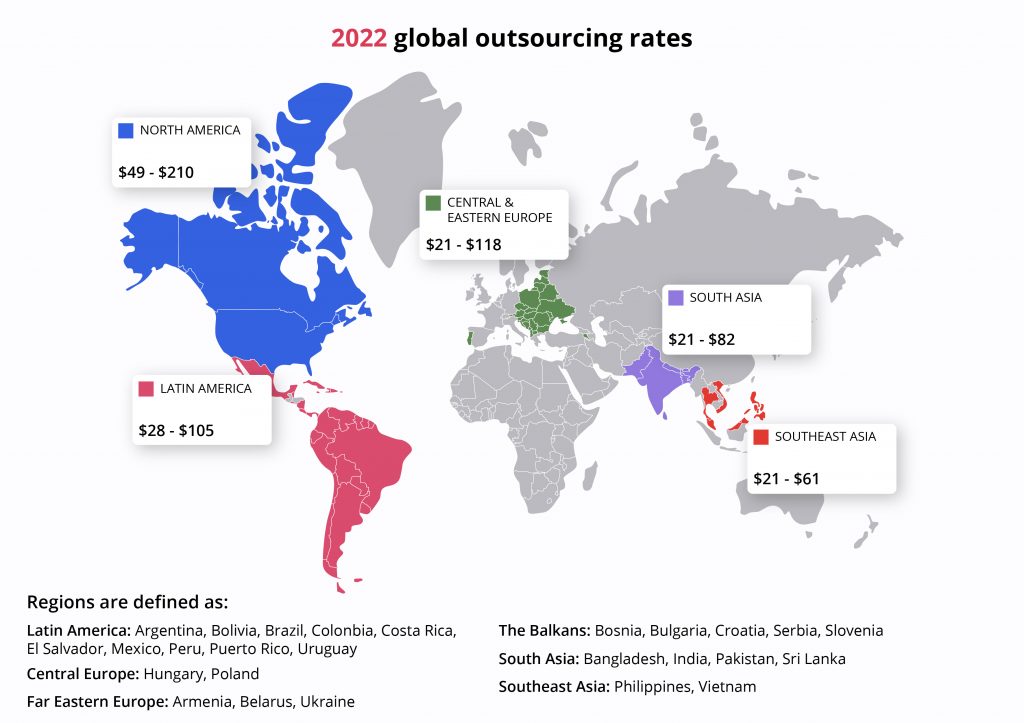
The broad range of fees charged by IT professionals worldwide means that a product can be developed in Latin America, Eastern Europe, or South Asia at half the price the owner would pay in North America or Western Europe. For instance, the same set of features built by the same number of specialists of like qualifications might cost $577K in the US, $324K in the Czech Republic, or $225K in India.
However, choosing a dev team based solely on the lowest pricing or budget estimation would be a mistake. You need a partner that has built multiple online marketplaces and knows exactly how to make an app like Airbnb.
Our Experience in developing a Guest and Host travel app
Alternative-spaces is an outsourced software development company with 20+ years of experience in creating e-commerce sites and mobile applications, including projects in the travel and tourism industries for international clients.
One of the projects we are proud to participate in is misterb&b, known as the ‘gay Airbnb.’ Its mission is far greater than enabling gay-friendly hosts to earn extra money and the guests to stay at safe places without being misunderstood or judged. misterb&b helps promote cultural exploration, foster friendships and connections across the global LGBTQ community, further charitable causes, and create a more tolerant world.
The service is available on a website and two mobile apps. Along with the standard private properties and LGBTQ-friendly hotels, they offer guides of major destinations, Gay Pride events worldwide, and other valuable information to the community.

Among the solutions implemented by Alternative-spaces devs to support these functionalities and operations, we can mention
- integrations with Stripe, MANGOPAY, Adyen, PayPal, Tipalti, and Payoneer for diversified payment opportunities;
- integration with property listing aggregators and providers like Booking.com, Rentals United, Guesty, Ospita from Koedia, and BookingSync;
- an improved search engine that allows quick search within a 2M+ listings database using various filters;
- a fraud detection system;
- a unique censoring engine designed to preclude nudity and abusive content from appearing on the site pages.
If you have any questions or need help with creating a web or mobile application, nothing could be easier than asking our consultant now.

Content created by our partner, Onix-systems.
Source: https://onix-systems.com/blog/airbnb-like-app-development Home
Home